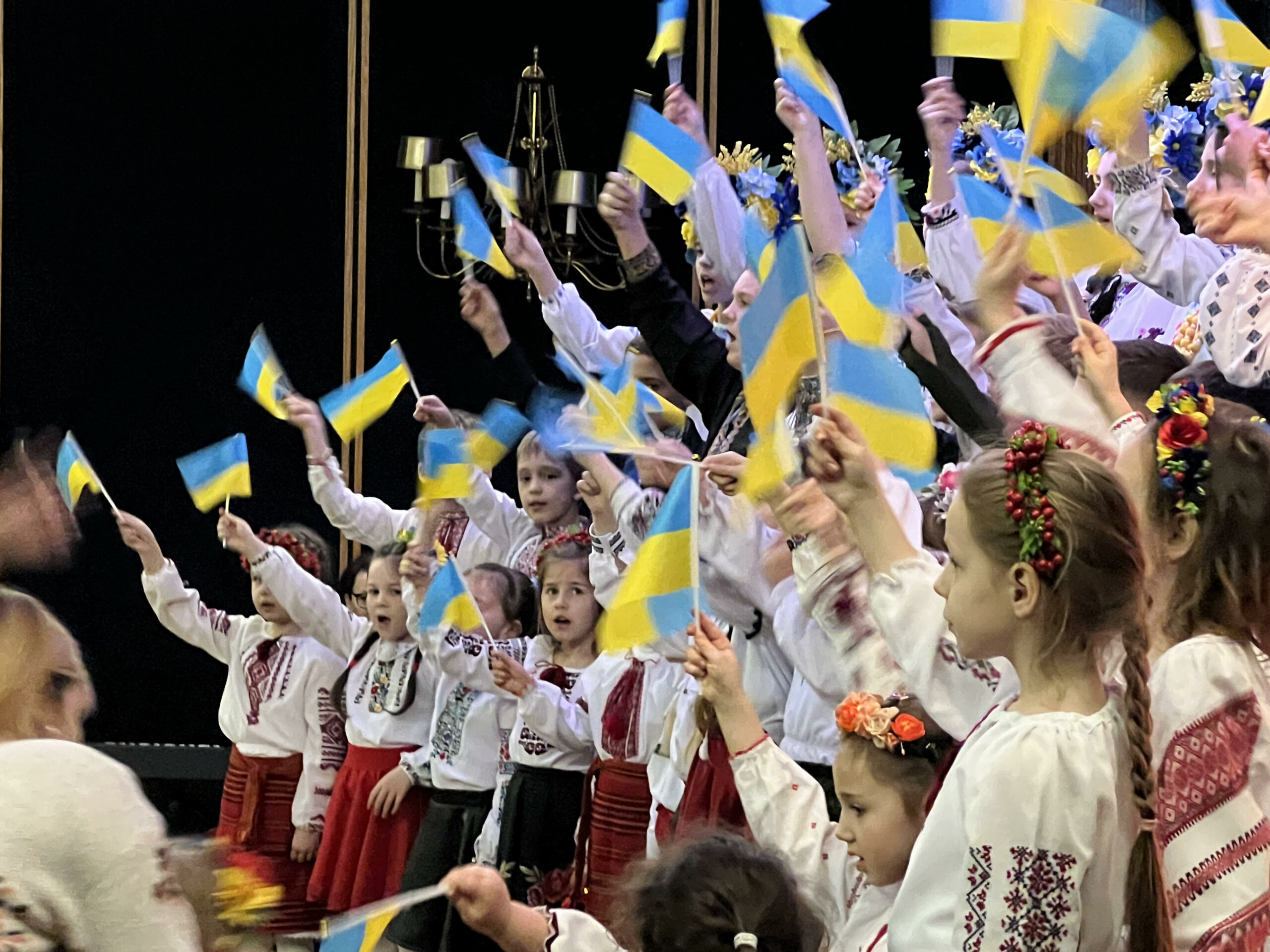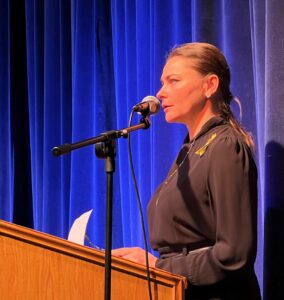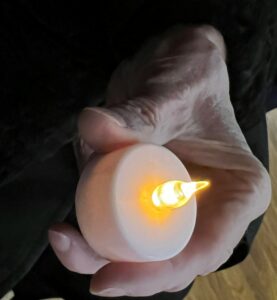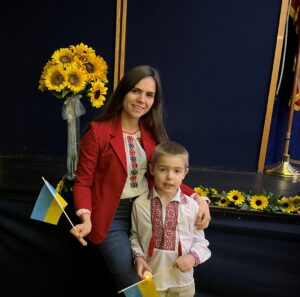DelVal Ukrainian-Americans Hold Vigil for First Anniversary of Russian-Ukraine War

Several hundred people gathered at the Ukrainian Educational & Cultural Center in Abington Friday evening for a solemn candlelight vigil marking the first anniversary of Russia’s invasion of Ukraine.
At the emotional gathering, people prayed, sang, chanted “Slava Ukraini!” (Glory to Ukraine), and listened to speeches, many holding small blue and yellow Ukrainian flags and tiny electric candles.
“Almost a year ago, the world’s leaders gave Ukraine only three days to survive, said Iryna Mazur, honorary consul for Ukraine in Philadelphia. “But today, we stay alive, stay strong and stay together. Ukraine’s response to Russia’s brutal invasion has received widespread international acclaim and recognition and has united millions of hearts in support of Ukraine.”

Iryna Mazur
“Like never before in my life, I see the similarities between the core values of our two nations and the American and Ukrainian people, Mazur, a Huntingdon Valley resident, said. “The ongoing nine-year war against Ukraine has lasted twice as long as World War II,” she said, counting the beginning from the Russian annexation of Crimea. “The last 300 years of Russia’s imperialism inflicted the systemic genocide of the Ukrainian nation when over 10 million Ukrainians were starved to death during artificially created famines when millions were killed in concentration camps and prisons of Siberia when for centuries Ukrainians have had to survive forceful and brutal ‘Russification’ because their language, art, and history were targeted.”
She thanked Americans and the Biden administration for their support. The U.S. had approved about $50 billion in military and other aid for Ukraine last year, with President Joe Biden announcing $500 million more in military aid on his recent trip to Kyiv. Sec. of State Anthony Blinken also announced additional sanctions against Russia as the anniversary loomed.
Eugene Luciw, master of ceremony, also spoke emotionally about what “Moscovite hordes” are doing in the ongoing war.
“They are murdering innocent civilians, they are blowing up hospitals, they are killing children, they are doing unfathomable things with our women,” Luciw said. “They are stealing our children, 260,000 of them, and placing them with families throughout Russia to disperse them. They are placing our men, women, and children in filtration camps; that’s concentration camps. Their ethnic cleansing and genocide know no measure.”
“Grief, terror, concern, worry. We cry, we suffer with our brothers and sisters in Ukraine and yet, we take pride and joy in the accomplishments of our people,” he said. “So through this sadness, there is a resurrected feeling that we have finally turned the tide against this age-old enemy of Ukraine that’s tried to destroy us over centuries.”
“They tried to destroy the Ukrainian spirit, but they did not, and they will not,” he said. “They’re pushing them back, and if the assistance of the west continues, they’re going to drive them out.”
Protestant ministers and Catholic priests also spoke and led prayers in English and Ukrainian.
The Very Rev. Father Roman Pitula, the rector of the Ukrainian Catholic Cathedral of the Immaculate Conception in Philadelphia, said Ukrainians are strong and united.

Philadelphia residents Olena and Shadvyi Vladyslav escaped the war in Ukraine six months ago.
“We stand on the side of the good and we fight against the evil,” he said. “Don’t cease to pray but pray to cease the war.”
Pastors Pavlo Nemesh of the First Ukrainian Evangelical Baptist Church of Philadelphia said, “One of the things we discovered in our church and our community was the Book of Psalms. We sang a lot of psalms, and we read a lot of them, and they offered comfort and hope for us. I want to urge all of you to attend your churches, your parishes and pray, sing, and continue to ask God to send peace.”
Before the event, Delaware County District Attorney Jack Stollsteimer spoke to the Delaware Valley Journal about his Ukrainian roots. His maternal grandparents were Ukrainians who were captured by the Germans during World War II and forced into slave labor camps. His grandmother worked on an assembly line making V-2 rockets. The Germans compelled his grandfather to clean tanks returning from the battlefields. They were liberated by American soldiers, whom his grandmother said were the first soldiers who were kind to her. After six years of living hand to mouth on the streets of Europe, they immigrated to the U.S.
“This is an important day for every one of us of Ukrainian descent, said Stollsteimer. “We are so proud of the Ukrainian people, who are fighting for freedom. The Ukrainian love of freedom is more powerful than the Russian repression.
The Soloveyky (nightingale) Children’s Choir sang the Ukrainian national anthem and “God Bless America.”
And the Prometheus Ukrainian Male Chorus of Philadelphia sang a rousing Ukrainian folk song. The group then chanted in support of Ukraine.
“Let’s get it done!” said Luciw. “Let’s beat back that snake in Moscow!”
Please follow DVJournal on social media: Twitter@DVJournal or Facebook.com/DelawareValleyJournal




